Hello Visitor! Log In
Program Framework for the World Academy of Art & Science
ARTICLE | November 7, 2011
By WAAS Strategic Planning Committee
Garry Jacobs, Winston Nagan, Ruben Nelson and Ivo Šlaus
This document forms part of the second report of the WAAS Strategic Planning Committee presented to the Board of Trustees in May 2010 but never circulated to our Fellows. We publish it now inviting readers from both within and outside the Academy to contribute their ideas on the type of knowledge the world really needs today to effectively address the pressing problems and unprecedented opportunities unfolding. Comments can be sent to spc@worldacademy.org.
At the time the World Academy of Art & Science was founded, there were very few international non-governmental organizations devoted to the free exchange of ideas and none so encompassing in its breadth as WAAS. The very conception of the Academy constituted an original idea and a pioneering initiative. In the present age of globalization, networking and the World Wide Web, this is no longer true. The unique composition of the Academy's membership is no longer sufficient justification for the Academy's existence. During the early phase of the strategic planning process, WAAS Fellows were unanimous in describing and conceiving of this as a value-driven organization that makes a significant and concrete contribution to addressing the pressing problems of the world today. A broad umbrella for diverse interdisciplinary dialogues may form one part of the Academy's program, but our unique composition needs to be leveraged to generate original perspectives that transcend current knowledge and contribute meaningfully to addressing real social issues. Generating and projecting original insights, ideas, perspectives or solutions to the opportunities and challenges of the 21st century is a tall order, but it is the only meaningful way for us to play the significant role in world affairs envisioned by our founders.
With these objectives in mind, the SPC sought to develop a Program Framework that would be sufficiently focused to address the most pressing contemporary social issues while at the same time sufficiently broad to encompass the full spectrum of the arts, humanities and science. It became evident that in order to generate original and unique ideas, the framework would need to start by recognizing the limitations in current approaches to knowledge and formulating its own conception of the type of knowledge the world needs. Based on the Foresight model suggested by Fellow Ruben Nelson, we began by examining our conception of what we mean by reliable knowledge. We then proceeded to identify a set of perspectives based on this conception which can be applied to evolve original insights and ideas relating to a wide range of issues.
1. Characteristics of Reliable Knowing
The reliability of our knowledge determines our ability to properly understand problems and formulate effective solutions. Therefore, it is essential that the Academy's strategic plan and program framework incorporate criteria for reliable knowing. This section identifies fundamental characteristics of reliable knowing which can be applied to the identification, comprehension, and effective response to social and policy issues.
Figure 1: Characteristics of Reliable Knowing
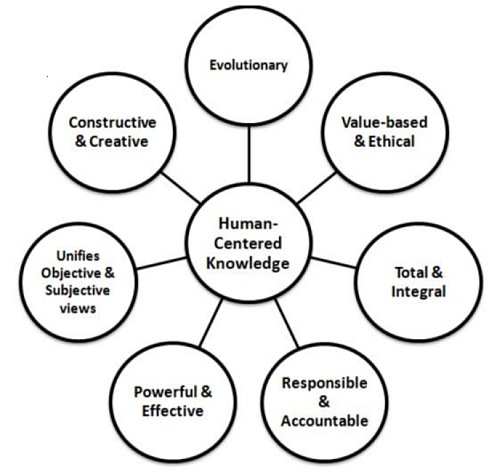
Human-centered Knowledge: Reliable knowing related to social consequences and policy implications must place pre-eminent value on the welfare and well-being of human beings, individually and collectively, and the sustainable development of human society.
- Evolutionary Perspective: Reliable knowing should recognize that human institutions exist in an ever-changing, ever-evolving social context, so that tomorrow's knowledge may no longer be limited by outdated values, ideals and social realities of today or tomorrow.
- Value-based or Ethical Perspective: Knowledge of human systems must be judged by the values it seeks to fulfill, for the laws and processes governing society and human behavior are created by human beings for human welfare.
- Total & Integral: Reliable knowing is interrelated and inseparable based on an integral knowledge of society and humanity that transcends and unifies partial perspectives. It encompasses and integrates the perspectives of the sciences, arts, and humanities.
- Responsibility & Accountability: Reliable knowing with respect to human systems is based on an explicit or implicit understanding that human beings are fully empowered, responsible and capable of resolving the problems they create.
- Reunites the Objective & Subjective: In the study of humanity and society, there is no objective truth independent of the subjective perceptions and attitudes of those who examine it. Reliable knowledge identifies the subjective points at which our attitudes and behavior must change to effectively address a problem that manifests objectively in the world around us.
- Constructive & Creative: Reliable knowledge is based on the creative imagination to perceive the opportunities as well as the challenges, the solutions as well as the problems.
- Powerful & Effective: Reliable knowledge contains within itself effective power for action. Reliable knowledge is complete knowledge which addresses problems without giving rise to new problems or generating unintended negative side effects.
2. Perspectives on the Emerging Global Context
The principles of reliable knowing can help us formulate a set of perspectives for approaching global issues. Based on the criteria for reliable knowing, we have identified seven perspectives which can be applied to arrive at reliable knowledge pertaining to global challenges and opportunities. These perspectives are intended to serve as conceptual guidelines for the definition and resolution of issues.
- Human Welfare & Well-being:A human-centered, value-based perspective on the human context is one which is centered on meeting the needs of all human beings in the most equitable and effective manner. Each aspect of the global context should be evaluated in terms of how effectively it meets fundamental human needs and the highest human values.
Figure 2 : Human-centered knowledge
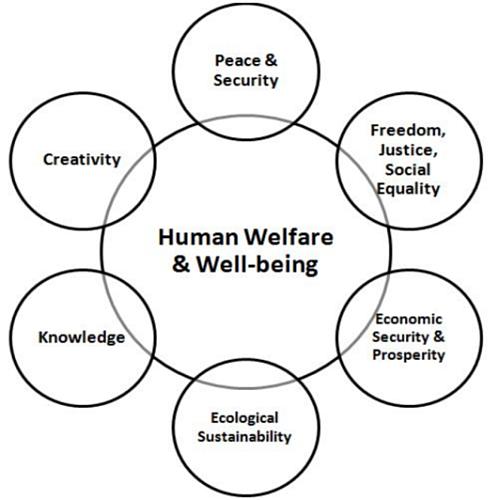
- Comprehensive Perspective & Solutions: There is an inextricable relationship between political, legal, economic, social, cultural, organizational, psychological and ecological factors. Reliable knowing calls for a comprehensive, total and integral perspective that reflects the relationship between the part and the whole and identifies solutions that will deliver the greatest overall benefit to the whole of humanity.
Figure 3 : Comprehensive Perspective & Solutions
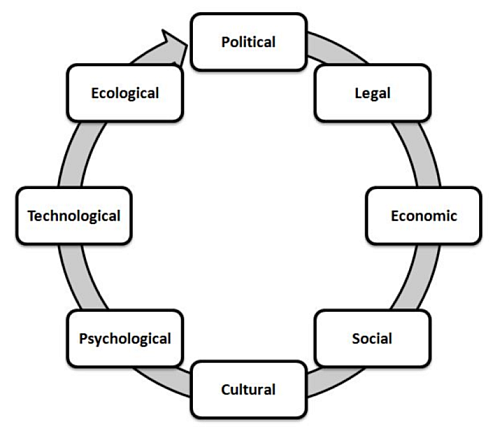
- Whole World Perspective: All people, nations, and fields of activity constitute a single integral whole that is in a process of continuous evolution and whose parts are continuously interacting with one another to create new opportunities and challenges.
Figure 4 : Whole World perspective
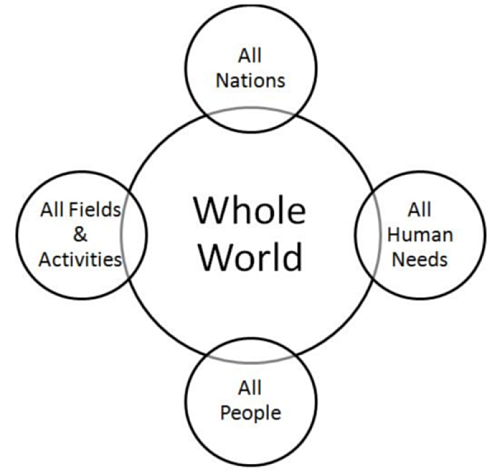
- Evolutionary Perspective: Reliable knowledge has to view past, present and future as various points on an ever evolving continuum. Past theory and precedent are an insufficient qualification for future practice.
- Opportunity-based Perspective: Reliable knowing should lead to the creation and identification of new opportunities, not merely a preoccupation with solving problems and meeting anticipated challenges.
- Effective Knowledge: In the measure knowledge is reliable, it generates real power to solve problems and tap opportunities without unexpected and undesirable consequences associated with partial knowledge. Knowledge is effective when it is comprehensive and when it takes into account both the objective and subjective dimensions.
3. Program Framework
The primary objective of the Academy's founders was to promote human welfare through the application of knowledge that is global, objective, scientific and imbued with the highest ethical standards and sense of responsibility. The Manifesto they drafted "Science and the Future of Mankind" identifies the enemies of peace that need to be conquered as hunger, sickness, waste and destruction, intolerance, ignorance, resignation and fear.
As we enter the 21st century, it is evident that the problems of security, economy and ecology facing humanity now cannot be effectively addressed at the national level. Global governance and sustainable development, broadly defined, encompass the major fields through which the application of reliable knowledge is needed to promote human welfare.
- Global governance includes issues such as the elimination of war, abolition of nuclear and other weapons of mass destruction, global financial management, ecological security, rule of law, democratization at the national and international level, etc.
- Sustainable development includes issues related to life styles and living standards, employment, health, education, and culture. In fact, most issues of global significance today span both categories to some extent. For example, employment security and financial stability can no longer be adequately addressed without international cooperation.
The Program Framework is an inclusive approach intended to provide focus and perspective, not to limit or exclude any important issue or field of knowledge. The approach is issue-based rather than based on the traditional division of disciplines. It is a means of conceptualizing issues of global significance in a manner that ensures a human-centered perspective and recognizes the central importance of applying a comprehensive integral knowledge. The program framework is depicted in figure 5.
Figure 5: Program Framework
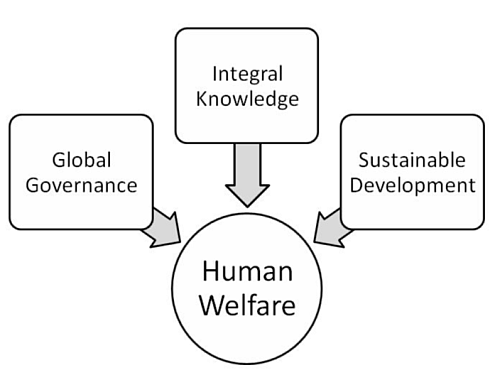
4. WAAS Program Thrust Areas
- The broad conceptualization presented in the Program Framework lends itself for application to a very wide range of issues. Based on ideas and proposals from Fellows generated during the planning process, the Program Framework can be further defined in terms of major thrust areas. The delineation of thrust areas is intended to create a focused agenda, but it is sufficiently inclusive to encompass a very wide range of issues such as global security, global financial management, economics of human welfare, democratic global governance, human security, education, science, research, sustainable development, national sovereignty, global development, environmental degradation, global interconnectedness, the internet, freedom, rising expectations, money, law and governance, health and health care, as well as other evolutionary trends.
- The relationship between the program framework and major thrust areas is depicted in figure 6 below.
- Arts & Humanities: Special reference is necessary with regard to the arts and humanities. Although both are encompassed under the educational and cultural thrust areas, some may consider that they deserve separate consideration. Reflecting on the intentions of the Academy's founders, we conclude that their primary purpose was to address pressing social issues. Their rationale for bringing together the Arts & Sciences was to demonstrate the relevance of all intellectual viewpoints to forge an integral perspective on these issues, rather than to promote any particular field of knowledge. Therefore, the program framework and thrust areas are focused on issues rather than subjects.
Figure 6 WAAS Program Thrust Areas
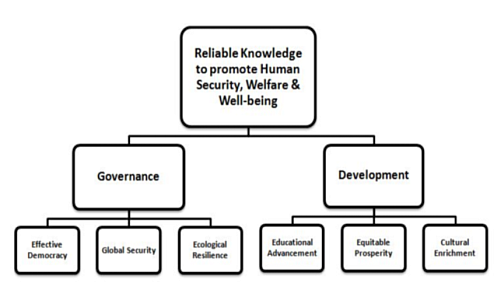
5. Real-Ideas to Change the World
- Issues-based Approach
- The Program Framework provides guidelines regarding the type of knowledge and the types of issues that the Academy should seek to address. It does not identify any specific issues on which WAAS can make a significant original contribution to global human development.
- The identification of a specific message to project - one or more positions the organization stands for -- has been one of the factors distinguishing organizations such as Club of Rome and Pugwash, whose programs have had visible, global impact.
- The decision of the Board in 2007 to adopt the Abolition of Nuclear Weapons as a specific objective of the Academy marked a significant step in identifying WAAS as an organization that stands for idealistic positions on issues of paramount concern to our founders. This decision activated the participation of some Fellows and generated a series of events, and a collaboration with Global Security Institute, Middle Powers Initiative and Jasjit Singh's work on nuclear disarmament. The limitation we have faced on this issue, has been our inability to define a unique position or contribution that we could make to distinguish the Academy from Pugwash, IPPNW, Global Security Institute and countless other organizations dedicated to a similar goal.
- Real Ideas Framework
- As a complement to the Program Framework described above, the SPC recommends that the Academy also adopt an approach designed to identify specific issues on which WAAS can make a significant, original contribution.
- Real Ideas can be defined as ideas with self-effectuating power. The acceptance of the idea carries with it the capacity to change our perceptions, attitudes and actions.
- From Problems to Solutions: The program framework identifies global issues of importance. The emphasis is on a problem that needs to be recognized and addressed. Here the focus is on advocacy of original ideas, bold strategies and essential actions that are needed to resolve challenges and tap opportunities. We do not just discuss an issue. We take a position on what should be done to address it.
- Over the next two years, the Academy should seek to identify 3-5 Real-Ideas that can change the world, ideas akin in their originality, scope and broad appeal to the Club of Rome's conception of "limits to growth." Whatever controversy may be associated with the idea, the fact remains that it raised the issue of sustainability to the top of the world's intellectual agenda and has prompted constructive research and discussion of this crucial issue throughout the world.
- WAAS should ask the following question to its entire membership: "Can you identify three to five original ideas that, if widely publicized, accepted and implemented today, can have the most profound positive impact on the future welfare and well-being of humanity?"
- The very act of asking this question will help energize and generate greater involvement among our Fellows and communicate to them the Academy's intention of making a real difference in world affairs.
- Once identified, the Academy can utilize its vast network of relationships with leading thinkers and organizations to project these seminal ideas and partner with other organizations to create an umbrella agency to bring these ideas into public awareness and promote their actual implementation.
- Strategic Partnerships have a crucial role to play in this strategy. Once the Academy has identified, developed and endorsed a powerful idea for dissemination, it can act as an umbrella or magnet for other organizations with similar or complementary views, so that the idea acquires the characteristics of a social movement.
- Some issues that could lead to the formulation of Real Ideas are discussed below to illustrate the approach.
- Full and Guaranteed Employment
- Full and guaranteed employment is global in significance and essential for achieving equitable and sustainable human security, yet even ILO has not had the courage to take a clear position on this issue for political reasons. The proceedings of the Academy's Global Employment Challenge include compelling arguments for the adoption of full and guaranteed employment as a fundamental human right and policy of every government. In view of the widespread concern today with high and rising levels of unemployment, effective advocacy of this view could propel this issue to greater international visibility. Through the GEC, WAAS is already associated with a number of organizations committed to this goal. The Academy can partner with organizations such as Club of Rome, ILO, Asian Development Bank, Centre of Full Employment and Equity, University of Newcastle (Australia); the Cambridge Centre for Economic & Public Policy, University of Cambridge; Levy Economics Institute of Bard College (USA) and the Center for Full Employment and Price Stability (CFEPS), University of Missouri-Kansas City.
- Integration of education with employment - The GEC has documented that a major reason for inadequate job growth is the widening gap between the skills required by modern economies and the actual prevalence of skills in the work force of both economically advanced and developing countries. This is one manifestation of the disconnect between the present system of education and the evolving needs of society. A restructuring of educational methods and content to align it with emerging social needs will dramatically speed job creation and reduce unemployment. WAAS could partner with organizations such as UNESCO, UNDP and UNIDO on this issue.
- Employment and Social Stability - The Academy's e-project on Global Social Revolution focuses on the linkage between poverty, unemployment, widening economic inequality, social unrest and terrorism. Greater awareness of the relationship between employment and terrorism could focus attention on constructive strategies to address the root causes of social violence.
- Global Governance
The Academy's e-project on "From Global Crisis to Sustainable Development" is based on the premise that the proliferation of nuclear weapons and other armaments, the spread of terrorism, the international financial crisis, rising economic inequalities and unemployment, ecological issues related to energy and climate change all have a common basis. Solution to all these issues requires emergence of effective, democratic institutions for global governance. The current unrepresentative character of the UN Security Council, the veto power exercised by its five permanent members, and the absence of a global central bank are a few examples of the limitations of the current system. The Academy could undertake a far-sighted initiative to examine the essential requirements for effective global governance in the coming decades and project a model capable of overcoming the limitations that hamper the transition beyond the nation-state system.
- World University - a world-changing idea
- One example of an original seminal idea of global significance can be found in the Academy's original Manifesto. WAAS founders envisioned the possibility of the Academy itself functioning as an informal "world university", a visionary idea which was far ahead of its time.
- Today that is no longer the case. The enormous increase in demand for higher education all over the world will necessitate development of entirely new models of educational delivery which can accommodate a vast increase in student population with far greater efficiency and lower cost than traditional forms of higher education.
- Technology now makes it possible to consider very different models for delivery of higher education, as different from existing models as Amazon's becoming the largest book seller in the world without operating a single bookstore.
- Internet-based education is not a new idea. Many universities are already offering web-based courses. But none of these constitutes a truly inclusive global approach to delivering higher education. A global system would generate enormous benefits in terms of efficiency and equality of opportunity. Imagine a global network that enables millions of students around the world to access the top academicians in each specialized area of their interest.
- In addition to evolving a new model for delivery of education, the World University should also present an opportunity to found a new intellectual basis for the organization of knowledge based on the principles of Reliable Knowing discussed above.
- A project based on this idea could include
- Examination of the strengths and weaknesses of traditional forms of higher education.
- Assessment of the global demand for higher education over the next few decades and challenges in meeting those needs through traditional means.
- Survey of alternative technology models now in operation or under preparation to identify the most advantageous model.
- Research on alternative bases for the organization of knowledge and education based on the concept of Reliable Knowing.
- Global survey of educational leaders on this issue and one or more international conferences to explore alternative models.
- Identification of global players interested in these issues as potential partners with WAAS, including international organizations such as UNESCO, national governments of developing countries with large populations, scientific and other academic institutions, commercial organizations, etc.
- Research and development of university level on-line course-ware in collaboration with United Nations University.
- Login to post comments

